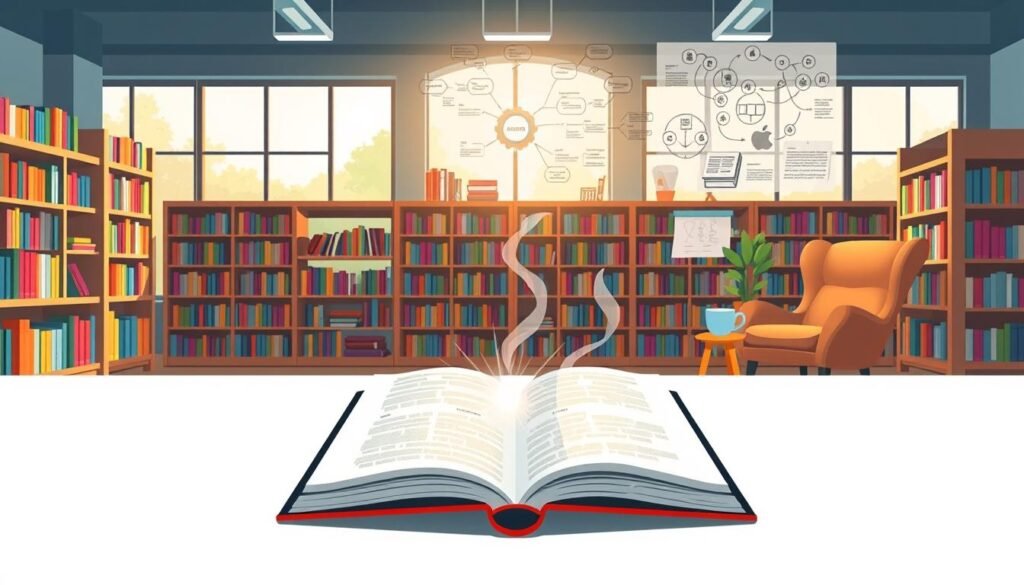How to Read: Essential Tips for Better Reading Skills

Effective reading is key to academic success. It helps students understand and remember information from various sources. Improving your reading skills can boost your learning and thinking abilities.
Reading comprehension means understanding and using what you read. It involves finding main ideas and supporting details. It also includes recognizing story structure and using graphic organizers.
Active reading engages your brain before, during, and after reading. This boosts understanding and memory. It includes strategies like reading aloud and answering questions.
Key Takeaways
- Active reading strategies enhance comprehension and retention.
- Using graphic organizers and summarizing content improves understanding of academic texts.
- Practicing new vocabulary and building background knowledge are crucial for complex reading.
- Active reading techniques boost overall reading skills and academic performance.
- Developing effective reading habits leads to long-term improvements in comprehension.
Understanding the Importance of Reading
Reading is crucial for personal growth and success. It’s a complex process that engages the mind and broadens our worldview. Regular reading offers many benefits, from improving cognitive function to encouraging lifelong learning.
Benefits of Reading Regularly
Reading regularly can significantly impact our lives. It expands vocabulary and enhances critical thinking skills. Reading also improves communication by exposing us to various writing styles.
How Reading Enhances Cognitive Function
Reading stimulates the brain, boosting memory and concentration. It creates new neural pathways and strengthens existing ones. This mental exercise can improve problem-solving and analytical thinking skills.
Reading also fosters creativity and enhances our ability to focus. It’s a workout for the mind that pays dividends in many areas of life.
Reading as a Tool for Lifelong Learning
Reading opens up a world of opportunities for continuous learning. It exposes us to new ideas and cultures, broadening our understanding of life. By reading, we develop a growth mindset and adapt to our changing world.

“The more that you read, the more things you will know. The more that you learn, the more places you’ll go.”
– Dr. Seuss
The importance of reading is undeniable. It enhances our cognitive abilities and supports lifelong learning. Embrace regular reading to unlock a wealth of benefits and enrich your life.
Different Types of Reading Techniques
Readers have many ways to boost understanding and speed. Skimming and scanning are two key methods. Active reading strategies engage the brain before, during, and after reading.
Skimming vs. Scanning
Skimming helps grasp main ideas quickly. It’s great for previewing and reviewing long texts. Scanning finds specific facts and details.
Scanning is crucial for research. It targets exact information you need.
Active Reading Strategies
- Know your purpose: Establish why you’re reading and what you hope to gain from the text.
- Preview the text: Scan the headings, subheadings, and visuals to get a sense of the content.
- Integrate prior knowledge: Connect the new information to what you already know.
- Self-monitor: Pause periodically to ensure you’re comprehending the material.
- Summarize key points: Reflect on and articulate the main ideas and key takeaways.
Speed Reading Essentials
Speed reading boosts reading pace while keeping comprehension. It uses methods like chunking and eliminating subvocalization. These reading strategies can greatly improve your speed reading methods.
Balance speed with active engagement. This ensures deep understanding of the material.

“The more that you read, the more things you will know. The more that you learn, the more places you’ll go.”
– Dr. Seuss
Setting Up a Productive Reading Environment
A good reading environment is key for better comprehension and retention. By reducing distractions and creating comfort, you can boost your understanding of the material. Let’s explore how to set up an ideal reading space.
Minimizing Distractions
Eliminating distractions is crucial for a productive reading environment. A study by Ehri and Sweet (1991) showed how distractions affect reading concentration. Avoid TV, radio, or other noises that can disrupt your focus.
Consider making a quiet reading nook away from daily activities. This can help you concentrate better on your reading material.
Creating a Comforting Space
Physical comfort in your reading space can improve focus and information retention. A survey found that 44% of people like pillows and blankets for coziness. Another 29% preferred a comfortable chair for their reading area.
Try different seating options to find what works best for you. Adding soft textiles can make your reading space more inviting and enjoyable.
The Role of Lighting in Reading
Good lighting is vital for effective reading. In fact, 76% of people stressed its importance in an ideal reading environment. Poor lighting can cause eye strain and tiredness, reducing reading efficiency.
Find the right balance of light in your reading area. Using natural light when possible can help keep you alert and focused.
These strategies can help you create a productive and cozy reading space. A well-designed area can improve your ability to engage with the material. It can also boost your retention of the information you’ve read.
Developing Effective Reading Habits
Effective reading habits boost fluency and critical thinking skills. Building a steady reading routine takes time and effort. A personalized schedule, progress tracking, and community support can unlock reading’s transformative power.
Establishing a Reading Schedule
Set aside daily time for reading to build a lasting habit. Create a consistent schedule, like 30 minutes in the morning or an hour before bed.
Keep books handy on your nightstand or in your bag. This increases the chance you’ll read during free moments throughout the day.
Tracking Your Progress
Monitor your reading to boost motivation and sense of achievement. Set goals, like finishing a certain number of books per month or year.
Use a reading journal or app like Goodreads to track progress. Reflect on books read, lessons learned, and skills developed to stay engaged.
Joining a Book Club for Motivation
Surrounding yourself with fellow readers can enhance your experience and motivation. Join a local or online book club for discussions and shared perspectives.
Engaging with other book lovers can inspire you to try new genres. It can also challenge your thinking and keep you committed to reading goals.
Developing effective reading habits takes patience and dedication. A consistent routine, progress tracking, and community support foster lifelong reading love. These habits unlock countless benefits for personal growth and intellectual development.
| Strategies for Developing Effective Reading Habits | Benefits |
|---|---|
|
|
“The more that you read, the more things you will know. The more that you learn, the more places you’ll go.” – Dr. Seuss
Developing a reading habit is an ongoing journey. Use these strategies to nurture a lifelong love of reading. Unlock the power of words and watch your world expand.
Recommended Resources for Improving Reading Skills
Boosting reading skills is an exciting journey. Many resources can help you along the way. These include books, online courses, and apps for enhancing your reading abilities.
Books on Reading Techniques
Expert-written books offer deep insights into effective reading strategies. Kate Cain’s work explores the skills needed for successful reading.
Isabel L. Beck and colleagues stress the importance of building a rich vocabulary. Lori D. Oczkus provides practical strategies for improving reading comprehension in her books.
Online Courses and Workshops
Online courses offer guided instruction to refine your reading skills. These platforms cover topics from speed reading to active reading strategies.
They equip you with tools to enhance your retention and comprehension techniques. Interactive lessons help you apply what you learn effectively.
Apps That Enhance Reading Efficiency
Many apps support and elevate the reading experience. They offer timed reading exercises, vocabulary builders, and comprehension quizzes.
These tools can help you read more efficiently. Using them can deepen your understanding of the material you’re reading.
FAQ
What is reading comprehension?
Reading comprehension is the ability to understand and use what you’ve read. It involves engaging with the text and making meaning from it. This skill helps you analyze and synthesize information effectively.
What are best practices for improving reading comprehension?
Reading aloud and finding the main idea are key practices for better comprehension. Identifying supporting details and recognizing story structure also help. Using graphic organizers and answering questions can improve understanding.
Generating questions and summarizing content enhance comprehension skills. Practicing new vocabulary and building background knowledge are equally important.
How does reading regularly benefit cognitive function and lifelong learning?
Regular reading improves cognitive function and supports lifelong learning. It enhances vocabulary, critical thinking skills, and knowledge acquisition. Reading comprehension is a complex process involving knowledge, experience, and thinking.
What are the differences between skimming and scanning?
Skimming involves quickly glancing over text to get a general idea. Scanning is searching for specific information in the text. Active reading strategies include previewing the text and integrating prior knowledge.
How can a productive reading environment enhance comprehension and efficiency?
A productive reading environment is crucial for effective comprehension. Minimizing distractions helps maintain focus and concentration. Creating a comfortable space with proper lighting can improve retention and enhance the reading experience.
What are effective strategies for developing reading habits?
Establishing a regular reading schedule is key to developing effective habits. Tracking progress and joining a book club can provide motivation. These strategies offer opportunities for discussion and self-improvement.
After-reading strategies include self-checking comprehension and discussing material with others. Creating outlines or flashcards can also reinforce understanding.
What resources are available to improve reading skills?
Books on reading techniques and online courses can help improve your skills. Reading-focused apps and academic coaching provide personalized support. Web-based study guides offer in-depth strategies and expert guidance.





